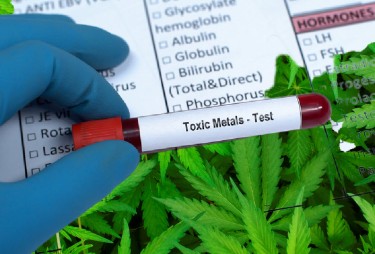
Inhaling dangerous metals from rolling papers is a possible health risk for cannabis users, according to a recent study published in ACS Omega. These studies had high concentrations of heavy metals such as copper, chromium, and vanadium, which alarmed researchers since they may pose health problems.
The investigation delved into the metal composition of 53 varieties of rolling papers and cones widely used in the cannabis industry. The findings should serve as a warning to both occasional and frequent cannabis consumers alike.
Uncovering Significant Findings and Associated Health Risks
The investigative team at Michigan’s Lake Superior State University embarked on a thorough examination of 53 different types of rolling papers and cones utilized within the cannabis industry. Their findings, published in ACS Omega, revealed a startling discovery: approximately one-quarter of the tested products surpassed established safety thresholds for metal inhalation, with copper levels being particularly noteworthy. These heightened concentrations were notably prevalent in papers featuring colorful designs or metallic embellishments, often favored for their aesthetic appeal by consumers.
Of grave concern to researchers was the potential neurological impact of these metals, especially when present in colored papers. The study underscores the alarming prospect of neurotoxic effects linked to prolonged exposure, potentially implicating a heightened risk of neurodegenerative diseases. Derek Wright, co-author of the study, expressed dismay at the lack of governmental oversight, particularly in states where regulations for cannabis flowers do not extend to rolling papers. This regulatory gap underscores the urgency for comprehensive oversight to safeguard consumers, especially those relying on cannabis for therapeutic purposes.
Wright's observations illuminate a disconcerting reality: many consumers assume that regulatory bodies oversee the safety of products associated with cannabis consumption. However, the absence of stringent regulations surrounding rolling papers poses a tangible threat to public health, particularly for vulnerable populations. Individuals leveraging cannabis for medicinal purposes, often grappling with pre-existing health conditions, could unknowingly expose themselves to further harm through the inhalation of toxic metals.
In essence, the study's revelations serve as a clarion call for swift action within the industry and regulatory spheres. Strong supervision procedures must be put in place as soon as possible, and safety regulations must be strictly followed in all areas of cannabis use. In addition to endangering customer safety, delaying the resolution of these issues damages the legitimacy and long-term viability of the emerging cannabis industry.
Advocating for Industry Response and Regulatory Reform
The cannabis business and regulatory agencies have both loudly called for action in response to the release of these data. Concerned about the study's ramifications, experts stress the urgent need for stricter laws and a radical change to safer production methods. Co-author of the research Derek Wright emphasizes how crucial it is to pinpoint the origins of potentially dangerous compounds in order to facilitate the creation of safer goods.
Daniel Curtis, an analytical and atmospheric chemist consulted on the matter, underscores the importance of future research endeavors. He advocates for a deeper understanding of how metals transfer from rolling papers through the combustion process. Such insights could inform targeted interventions aimed at mitigating exposure risks and enhancing consumer safety. With cannabis consumption on the ascent, the imperative to identify and address sources of toxic chemicals grows ever more urgent.
The study's consequences go well beyond the confines of scholarly research and have a significant impact on the hallways of industry. In order to put consumer welfare first and enact evidence-based reforms, stakeholders must work together in a coordinated effort. Regulatory agencies may protect the public's health and promote innovation by establishing a culture of openness and responsibility. In order to overcome these obstacles and reach its full potential as a catalyst for responsible growth, the cannabis sector will need to work together and demonstrate unshakable dedication.
Pioneering Safer Smoking Solutions: Innovations Towards Harm Reduction
As worries about the safety of rolling papers grow, forward-thinking businesses are leading campaigns to reduce dangers and encourage safer smoking environments. Leading the pack of these innovators is RAW, which is well-known for its dedication to transforming the cannabis industry. In their most recent project, RAW presents a novel rolling paper designed to reduce any impurities while highlighting the organic tastes found in cannabis. With a focus on the health and happiness of the customer, this invention signifies a paradigm change in product design.
The foreword to RAW's groundbreaking study highlights the industry's increasing realization of how important it is to give damage reduction methods top priority. RAW is working to raise the bar for cannabis accessory safety and purity by using state-of-the-art manufacturing methods and strict quality control procedures. The notably thinner paper not only makes smoking more enjoyable, but also demonstrates RAW's ongoing commitment to customer welfare.
Beyond product innovation, RAW's mission represents a larger culture of business responsibility and social concern. By promoting safer smoking options, the firm hopes to provide customers with educated choices and build a harm-reduction culture within the cannabis community. Furthermore, RAW's proactive strategy establishes a precedent for industry-wide collaboration and responsibility, igniting a collective effort to solve systemic concerns while maintaining the greatest levels of safety and integrity.
Customer safety must continue to be the priority as the cannabis business develops and diversifies. RAW's creative efforts are a ray of hope, encouraging other industry participants to take the lead in damage reduction. Through leveraging innovation and teamwork, the cannabis sector may steer towards a more secure and sustainable future where the welfare of users is the top priority.
Bottom Line
The study's findings underscore the urgent need for regulatory reform and industry response to address the presence of toxic metals in commercially available cannabis rolling papers. With significant health risks posed by inhaling heavy metals such as copper, chromium, and vanadium, consumers, especially those using cannabis for therapeutic purposes, are at risk. The absence of stringent regulations governing rolling papers highlights a critical gap in oversight, emphasizing the necessity for comprehensive safety measures to safeguard public health. Advocacy for safer production practices and innovative solutions, exemplified by initiatives like RAW's pioneering rolling paper, is essential to mitigate risks and promote harm reduction within the cannabis community. Ultimately, prioritizing consumer safety and implementing evidence-based reforms are paramount for the sustainable growth and legitimacy of the emerging cannabis industry.
TOXIC METAL LEVELS IN CANNABIS, READ ON...
WHY ARE HEAVY METALS TESTING OUT SO HIGH IN CANNABIS USERS BLOOD?






